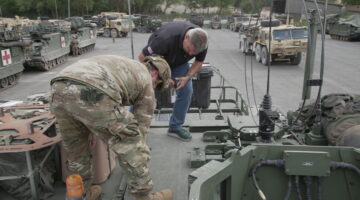
Allies of the United States and much of the defense industry have complained for at least 20 years about the complexity, slow speed and generally deleterious effects of the America arms export system. We are your friends, allies and partners say. You trust us enough to fight alongside us but you make it very hard to share technology. The last American ambassador to Australia argues below that AUKUS provides a rare chance — and an important one — to demonstrate just how much the US really values its Aussie allies.
The AUKUS project, which includes the purchase by Australia of nuclear powered submarines and much of their technology, is a clear opportunity and test case to foster urgently needed reform of the US arms export system.
During my almost two years as US Ambassador to Australia, a recurring complaint from members of parliament, Australian defense officials, and defense executives from both countries was that US technology transfer and export controls still are the major impediment to improved defense cooperation and interoperability, to deepening and broadening our economic ties, and to leveraging and growing the industrial and innovation bases of both countries.
It must be recognized that AUKUS, this seminal step in allied cooperation, will be slowed and frustrated without a corresponding top-all-the way-down rethinking and reform of the US technology export controls regime as it relates to close allies such as Australia and the UK.
Allied frustration extends beyond modern cutting-edge components and systems to include commercial replacement parts and decades old know-how. A 2019 report by the US Studies Centre in Sydney lamented that the continued failure of US export controls to treat trusted allies differently are barriers to bilateral cooperation with real and growing opportunity costs.
This occurs even though Congress approved Australia’s inclusion, with the UK, in the US National Technology Industrial Base (NTIB) in 2017.
RELATED: O No Canada: Is A Three-Eyed AUKUS An Augury For Change?
These barriers have been recognized at senior policy levels for at least two decades, including in the Joint Statements following the two most recent Australia-United States ministerial meetings that called for progress on NTIB “test cases.”
Australia is a trusted treaty ally, has been our partner in every conflict for the past century, and is a Five Eyes intelligence partner with a proven history and track record of protecting highly sensitive technology. Australia’s Collins class submarine fleet is near the end of its useful life and having those ships replaced in a streamlined process with modern, fit for purpose nuclear powered vessels contributes to deterrence and stability in the Indo Pacific.
This could be a business school worthy case study of how government defense procurements can resist inertia and change course in the customer’s national interest.
Australian Prime Minister Scott Morrison courageously directed his team to revisit, five years after the contract was awarded, the original premise that conventionally powered submarines could meet the future needs and requirements of the Royal Australian Navy as it faces the naval forces of the People’s Republic of China (PRC).
Once Australia saw nuclear powered submarines as a viable option, the government had every right in its national security interest to choose the best available technology. The PRC’s naval buildup, including massive quantities of anti-ship missiles and hundreds of surface ships, places a premium on the United States and its allies maintaining our advantage in submarines that can run more silent, deeper, and faster than our potential adversaries. Having the Aussies deploy modern, nuclear-powered, conventionally armed attack submarines increases that margin for all AUKUS partners and their allies.
Australia deserves our support and admiration as it has taken on a growing leadership role in the Indo-Pacific. Australia called for an international investigation into the origin of the COVID-19 virus. It has urged the Chinese Communists to honor the rights and freedoms guaranteed the citizens of Hong Kong in the 1997 handover agreement. It has urged an end to the oppression of the Uighur minority in Xinjiang, and it is a strong proponent of freedom of navigation and overflight in the South China Sea, contrary to unlawful territorial claims by the PRC Government.
In response, the Chinese government has launched unabashed economic coercion, banning or severely restricting imports of Australian barley, wine, thermal coal and beef. China’s self styled “Wolf Warrior” diplomats in Australia released to the press an incendiary list of 14 “grievances,” criticizing common sense exercises by Australia of its sovereign right to protect the integrity of its communications, political processes and government deliberations. The Global Times, an official English language mouthpiece of the PRC, has described Australia as “gum on China’s shoe.” Beijing’s Wolf Warriors taunt Australia on Twitter, inviting them to be “cannon fodder.”
As US Ambassador to Australia, two years ago, it was my privilege to invite Prime Minister Morrison to fly out to the USS Ronald Reagan to observe carrier exercises. The Reagan’s motto, taking after its namesake, is “Peace through Strength.” One of America’s strengths, compared to our strategic adversaries, is that we have friends and allies. I believe that we can all agree that our mates Down Under don’t stand alone when confronted with strategic aggression.
Arthur Culvahouse Jr. served as US Ambassador to Australia from 2019 to 2021.

